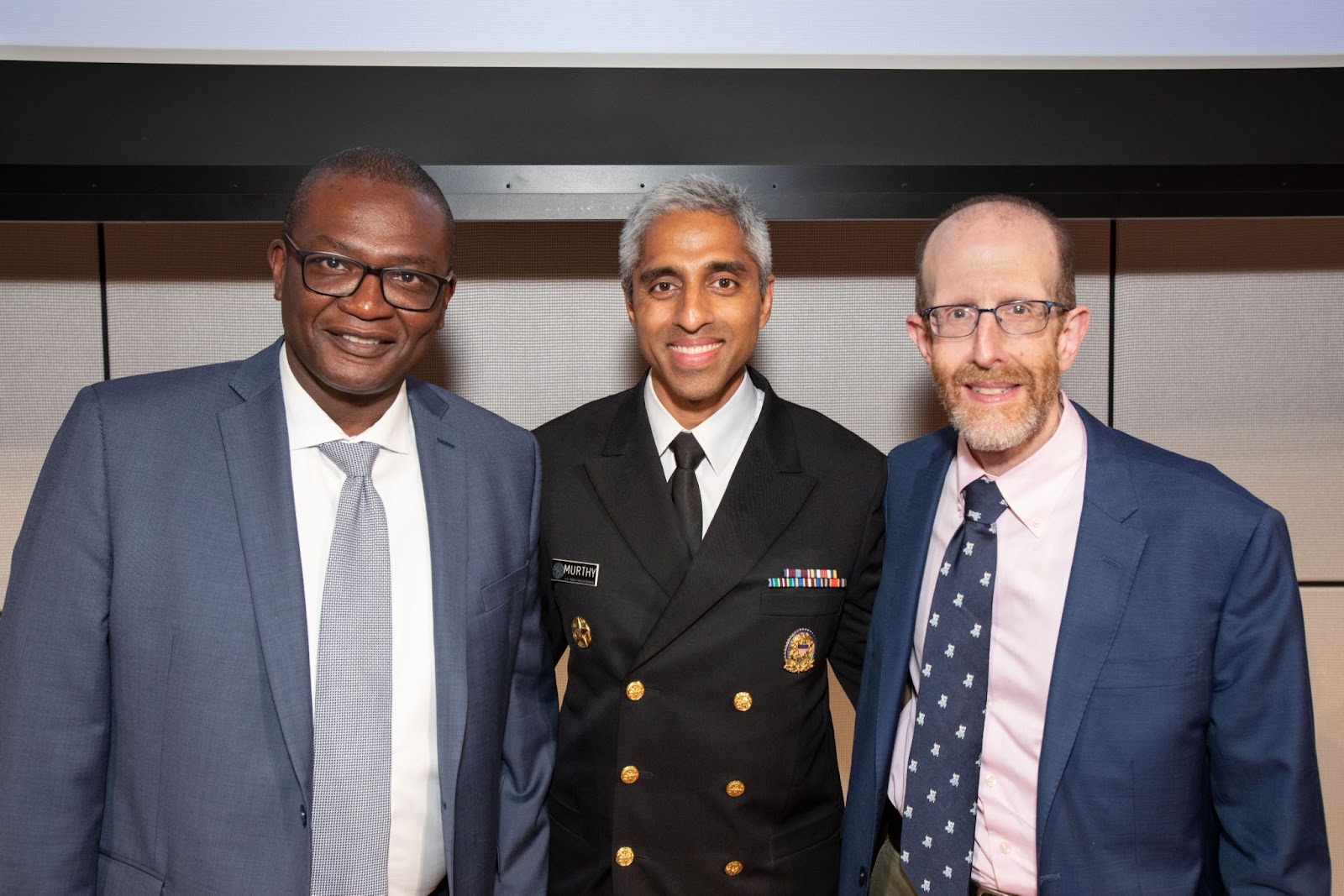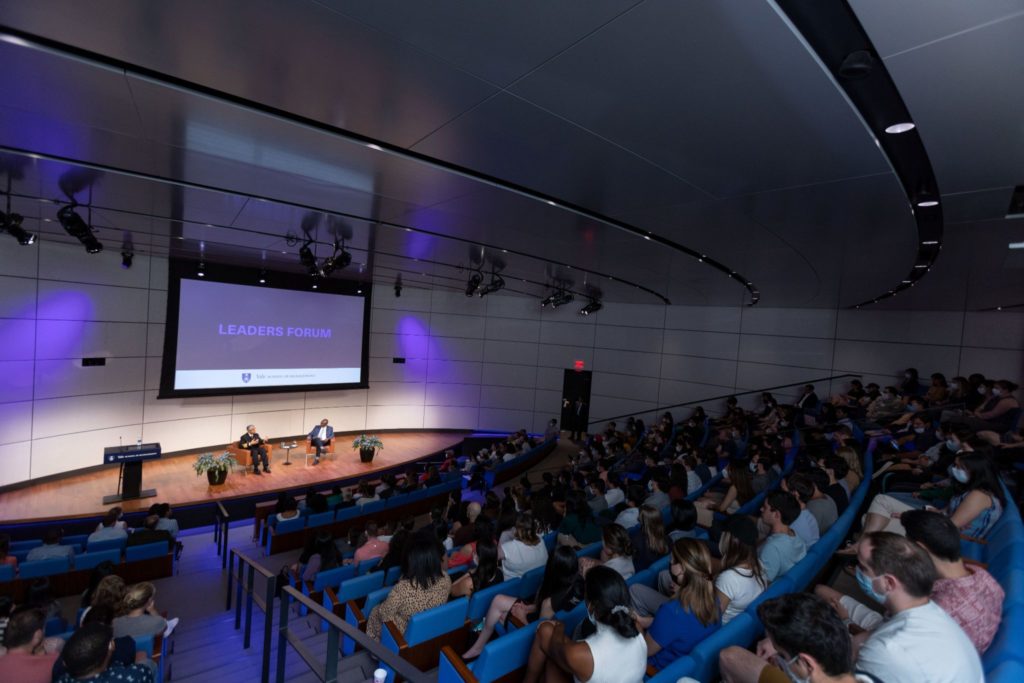Surgeon General Murthy visits Yale to talk youth mental health
U.S. Surgeon General Vivek Murthy SOM, MED ’03 spoke to three Yale graduate schools and an undergraduate health economics class to address current public health issues, with a special emphasis on the youth mental health crisis.

Courtesy of Howard Forman
U.S. Surgeon General Vivek Murthy SOM, MED ’03 arrived in New Haven on Thursday for a jam-packed, 18-hour visit focused on the youth mental health crisis and other pressing public health issues.
Murthy spoke to crowds at the Law School, the School of Public Health and the School of Management. He later led a panel discussion and interactive exercise at Southern Connecticut State University (SCSU), where he was joined by Gov. Ned Lamont SOM ’80 and students from the University of New Haven, Yale, SCSU and Gateway Community College.
Murthy also spoke to the undergraduate class “Health Economics and Public Policy,” taught by Howard Forman, professor of economics and director of the MD/MBA program, and met with Mayor Justin Elicker ENV, SOM ’10. Surgeon General Murthy even made time to explore New Haven, making a stop early Friday morning at Claire’s Corner Copia to stock up on the restaurant’s popular Lithuanian coffee cake, a favorite of Murthy and his wife, Alice Chen ’01.

“Don’t ‘stay in your lane,’” Murthy urged students. “Because your lane is far broader than others may appreciate.”
Forman, a long-time mentor to Murthy, organized the Surgeon General’s visit to New Haven. He explained that Murthy has been a frequent visitor to the Elm City, returning twice in recent years for Yale graduations and at least four times for visits with students, faculty and the Yale and New Haven community. For this visit, Forman said, he and Murthy wanted to be sure to reach beyond the Yale community’s confines. Forman said it was an important challenge to ensure they were engaging a wide array of constituencies, especially non-Yale New Haven.
“I wanted to come here particularly to hear the community and students about mental health and well-being and it’s exciting to see that people want to be part of the solution,” Murthy shared in an exclusive interview with the News.
Mental health has long been one of Murthy’s priorities. While a student at the School of Medicine, he helped create “The Healer’s Art,” a first-of-its-kind class focused on physician burnout, coping with loss and the art of healing.
Since March 2021, Murthy has been serving his second term as Surgeon General, an office he held during the Obama administration, and in December 2021, he released a landmark advisory on the youth mental health crisis and the COVID-19 pandemic. This paper has been cited nationwide, including by advocates for Connecticut’s recent package of mental health legislation, which was passed by the Connecticut General Assembly last spring.
Murthy said he is proud of the Advisory’s existing impact on mental health awareness, but there is still much more to come.
“We’ve had substantial engagement with members of the House of Representatives and the Senate on legislation that they would like to put forward to both increase access to mental health care but also to increase our investment in prevention programs,” he said. “All of us have to keep pushing forward the conversation on mental health so that we address the shame and stigma.”
According to Murthy, mental health was still a challenge during his time as a graduate student at Yale and as an undergraduate at Harvard, though perhaps not at the levels seen today.
Murthy noted that while people struggled with anxiety, depression and loneliness when he was in medical and business school, he “saw it a lot more when [he] was in college.” Then, people found it even more difficult to openly discuss mental health than they do now, he added.
“People didn’t talk about their struggles,” Murthy said. “It was very taboo, and though we talked a lot about how to deal with patients who were struggling with mental health and anxiety and depression, we rarely talked about ourselves.”
Murthy said he believes that everyone, including college students, can help address the mental health crisis, and he urged students to share their stories and challenge the stigma around mental health, advocate for “readily available, easily accessible” campus mental health services and ensure accountability by reporting mental health incidents.
Murthy said he is open to new ideas, including the potential formation of a youth advisory board, operating on a premise of “the more youth input, the better.”
“You don’t come to a solution by having a small group of administrators in a room by themselves,” Murthy said. “We need input, and young people have to be at the table.”
Murthy also noted that the youth mental health crisis has wide-ranging effects beyond young people, including on parents, employers and educational institutions.
“There is no pain worse as a parent than seeing your child struggle and not being able to help,” Murthy said. “From an institutional perspective, if you don’t support student and worker well-being, performance and productivity suffer.”
Forman offered some potential explanations for the growing youth mental health crisis, one that started even before the COVID-19 pandemic. He cited the rise of social media and the weakening of family and social networks as contributors to loneliness. However, he believes that perhaps even more significant is society’s move toward “greater returns on intellectual capital and skills.”
In Forman’s view, people are being left behind and are not reaping the rewards that used to flow to them for “just working hard,” in part due to an increase in the premium associated with post-secondary and post-undergraduate education. In that climate, there is an extraordinary amount of pressure on students who now face higher expectations and who may have an existential crisis if they fall short, he said.
“That puts an enormous amount of stress and strain on individuals and one would hope that we start to think about how we address that,” Forman said.
Some experts have argued that a new federal position, a “Psychologist General” or “Mental Health Czar,” is needed to address the ballooning mental health crisis. California established such a position in 2019.
Murthy is uncertain that such a position is necessary –– in his view, sustained prioritization of mental health by the public, Congress and the presidential administration will make the difference.
“In some ways you could call President Biden the mental health ‘lead’ for the Administration right now” he said. “This is the most alignment I’ve seen in my years in public health and that’s why I tell everyone on my team and people around the country that windows of opportunity don’t stay open forever and we have to use this moment to make sure we take as much action as we can.”
Kaveh Khoshnood SPH ’89, GRD ’95, faculty director of the Yale School of Public Health’s Humanitarian Research Lab, attended Murthy’s speech at the Law School and praised his remarks. However, Khoshnood, whose research focus includes refugee mental health, said he is eager to see Murthy and the federal government devote increasing attention to the mental health of migrant and refugee populations.
Kanhai Amin ’24, a student in Forman’s undergraduate class, admired Murthy’s engagement with students and described Murthy as “genuinely curious” about student perspectives. However, Amin feels much less optimistic about the federal government’s ability to make change than Murthy does. Amin lamented that the U.S. government has known about many of the health problems Murthy covered during his visit, including tobacco addiction and food deserts, for decades, yet has done little to improve the public health outlook.
Murthy said that students give him hope for the mental health crisis and the future of public health in the United States. Young people, both those with and without medical degrees, will lead the country toward a healthier future.
But Forman pointed out that it is not only students giving Murthy hope –– visits to campus by role models like Murthy play an important role in inspiring students and shaping their career aspirations. In a full circle moment, Forman fondly recalled Murthy’s excitement when, as a Yale student 20 years ago, he had the chance to meet former Surgeon General David Satcher during Satcher’s visit to Yale’s campus.
49.5 percent of American adolescents have experienced a mental health disorder.







